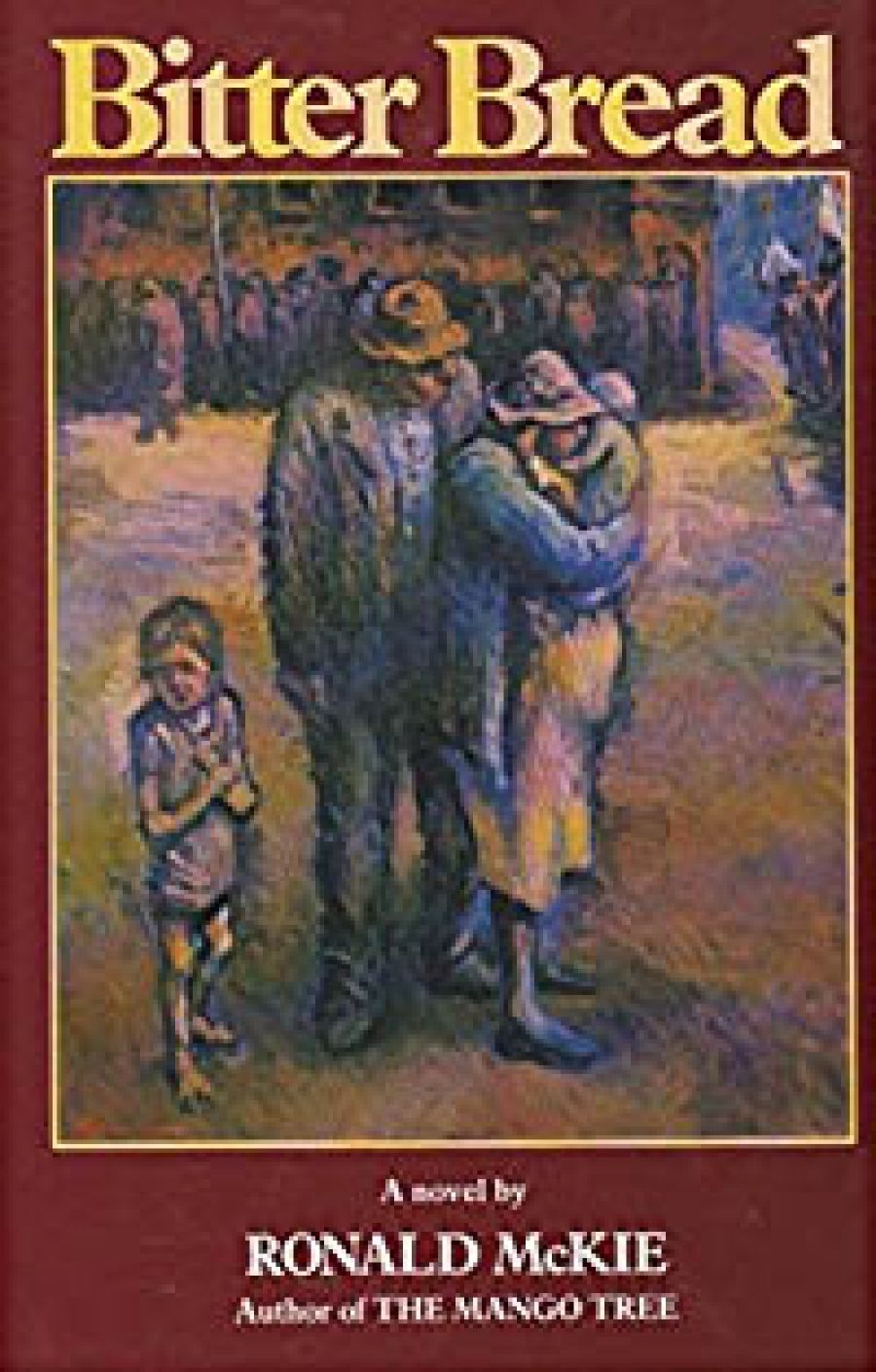
- Free Article: No
- Contents Category: Fiction
- Review Article: Yes
- Article Title: Enduring the depression
- Online Only: No
- Custom Highlight Text:
In The Mango Tree, McKie captured through a rich and tightly controlled prose the pain and bewilderment attendant on the shifting of a child’s consciousness towards the adult. At the same time, he evoked the shapes and textures of the remembered world of a Queensland town, of a way of life in the act of changing, with a muted note of lament. In Bitter Bread, there is a curious mixture of the mellow prose of The Mango Tree and passages where McKie’s control is loose, passages which spill over into the maudlin and smudge into bathos. Its narrative has not the inner logic of the earlier novel, tending to dart off into peripheral characters and events only limply tied to the central narrative line. At times, McKie seems to be shying away from the task of exploring the central relationship of two widely different consciousnesses caught up together in Melbourne during the Depression.
- Book 1 Title: Bitter Bread
- Book 1 Biblio: Collins, 264 pp, $8.95 pb
In the midst of the despair and destitution of the Depression years (and, ironically, the celebrations of Melbourne’s Centenary year), Ted Carter, the Australian journalist, and Justin Stanley, slightly older English emigre and displaced being, arrived from Brisbane in search of work – at least, Ted searches, while Justin tends to draw his Englishness round him like a cloak and feed his resentment of the country and his plight in it. Struggling to support them both, Ted is resentful of Justin’s attitudes, feeling that his concern for dignity is an indulgence they cannot afford, but he is also protective towards Justin and aware he is ill-fitted to the harshness of their circumstances. After thriving in Brisbane, their unlikely partnership becomes an echo of the economic slump as the relationship falters and stumbles through the privations of Melbourne. After ten years of exile in Australia, Justin feels a bitterness that is exacerbated by poverty. He retreats more and more into resentful contempt for Australians. The grudging feeling for the land that was developing while he worked on a farm near Brisbane (which he left when pursued by an outraged husband) dries up quickly in the grey world of Melbourne and he clings to his Englishness as if to the last bastion of civilisation.
Unexpectedly, instead of the direct engagement of the conflicting views of the emigre and the Australian, McKie allows Justin’s tirades against the mediocrity and sterility of Australian society to stand uncontested. Ted listens with tired amusement, enjoying them as if the antics of a child. In Ted’s protectiveness there is an underlying awe, almost a fascination with a suffering sensibility, for Justin is presented as ‘a tortured man’, a sensitive misfit. Yet he remains largely an enigmatic figure, intellectually and aesthetically distant. When he achieves some success as an actor and thus the assurance casually to throw off any need for Ted, a tendency to the maudlin takes over the resolution of their relationship. McKie seems to skirt around many of the issues it suggests, including that of their rivalry over the dreamer, Anna.
In Bitter Bread, McKie seems at his best building through fragments and glimpses a portrait of a society under siege, its casualties as grim as those of war. Through the observing consciousness of Ted are refracted images of people ‘ringbarked’ by despair: the shame of those tramping the streets, fearful of admitting to their families yet another failure; the Collingwood dosshouse smelling of ammonia and defeat; the dawn shuffle of worn soles and shabby hope; the hospital admissions of those who are starving; the ‘indecent exposure’ of once private possessions bared in shop windows to passers-by; the struggle to avoid the ‘bitter bread’ of the dole. For Ted, there is the accompanying irony of an editorial policy which plays up the economic recovery because of the Centenary celebrations.
Yet, while some of these fragments take on an Albrecht Dürer sharpness and bleakness, there are some mawkish elements also – men in susso greatcoats scrabbling in rubbish bins, a fragile girl with a loaf of bread, And, in the midst of surer language, there is often a grating use of analogy of the idiomatic, exaggerated kind (such as ‘jobs harder to find than nuggets in Collins St’ or ‘a curry pie had more feeling than Bert Smith’).
Minor characters tend to be stereotyped. In the boarding house in Richmond (the house itself vividly evoked), with Ted and Justin live Shaw, the poor medical student’ in the damp basement; Shirl, a sick and despairing prostitute, drawn to Blue, the son prone to drunken benders; and Mrs Bragg, his mother, who is long-suffering and given to simple wisdom. There is often color and life in the interaction of these characters, but they remain basically stereotyped figures.
McKie likens the casualties of the Depression to those of war and suggests ‘a whole society locked in static decay’, but many of the minor motifs of the novel remain shadowy and elusive. There are hints of the Centenary year as a kind of watershed for Melbourne; of the Depression as a kind of crucible for a whole society; of the attitudes to outsiders and those who do not observably conform; and, through Ted and Justin, of the shaping of a national identity through the interaction of Australian and emigre. However, in Bitter Bread, McKie cannot so smoothly tease out from the fragments an image of the whole, has not the control of The Mango Tree, and it is only an echo of the achievement of the earlier novel.


Comments powered by CComment